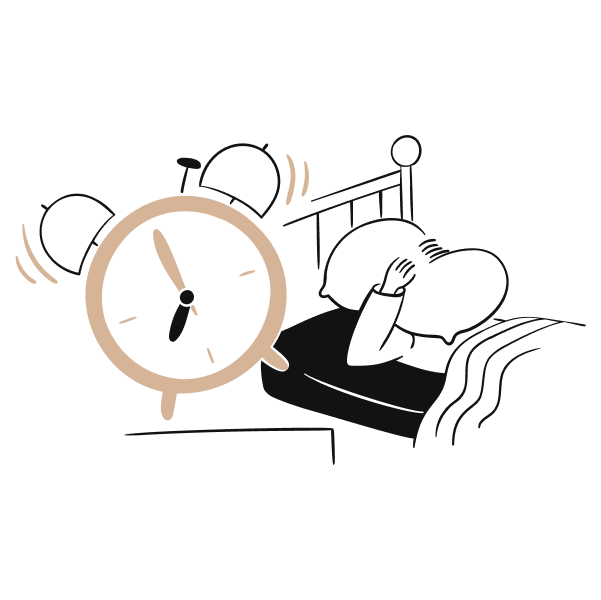You are sleeping poorly. Your sleep rhythm is disturbed and the lack of sleep begins to affect your daily activities. This may be due to specific physical or psychological symptoms. Find out more about exactly what insomnia is and what causes you to be unable to sleep.
What is insomnia?
If you suffer from insomnia, also called “insomnia,” you have persistently poor sleep. Your nights or days are disrupted because you lie awake at times when you actually want to sleep. Sleeping poorly once is not an instant disaster. If you notice that for prolonged periods you cannot sleep, this is called insomnia.
When you sleep badly, it can take different forms. You may recognize yourself in one or more of the following situations when you have problems sleeping:
- you are often tired during the day;
- you sleep at unusual times. At random times you most want to sleep;
- you have difficulty falling asleep. You have difficulty falling asleep when you go to bed;
- you exhibit unusual behavior while sleeping;
- you can’t sleep through the night; you keep waking up at night and can’t go back to sleep;
- you wake up too often or too early;
- you sleep restlessly.
In children:
- there is resistance to sleeping at bedtime;
- there is difficulty sleeping without help from a caregiver.
How do I know what a healthy sleep rhythm is?
For a “normal sleep rhythm,” it helps to always maintain the same sleep-wake rhythm. It really doesn’t hurt if you’ve pulled an all-nighter. Or have a night of “ceiling duty. But chronic sleep deprivation leads to multiple (health) problems.
Here’s how to determine what constitutes a good night’s sleep:
- How many hours you sleep per night.
On average, you sleep about 6 to 10 hours per night. Exactly how much varies from person to person. - How long it takes you to fall asleep.
Most people fall asleep about 20 minutes after their head hits the pillow. - How much you lie awake.
It is normal to sometimes wake up (briefly) during sleep. Especially early in the morning. - The amount of bad nights.
If you occasionally sleep poorly, it does not affect your rhythm. - Your age.
Depending on your age, you need more or less sleep. Also, you sleep less deeply as you get older.
Why can’t I sleep?
The causes of poor sleep vary from person to person, although the reasons can be divided into four categories. Below we explain the four different causes.
1. Mental complaints
Mental complaints often lead to poor sleep. Think of:
- Stress
Stress makes it harder for you to fall asleep. Do you experience too much stress during the day? Then in the evening your head and body do not have enough time to come to rest. You recognize this by a rushed feeling when you lie down in bed. It feels as if you are “on” too much. - Worrying
Worrying creates tension that prevents you from getting to sleep. We worry especially in bed at night because then we are all alone with our thoughts. There’s also a vicious circle lurking here: you’re worried about something, so you start worrying. This makes you feel rushed and anxious, and you prefer to want a solution right away. This rushed feeling does not promote your sleep. - Anxiety
Anxiety makes you experience a lot of tension. And when you are in bed, the distractions of the day fall away. Your fears get all the space they need to haunt your head. The result: falling asleep is difficult and you sleep badly. Moreover, you regularly wake up at night. - Depression
Also with depression, falling asleep is more difficult and you wake up frequently at night. Gloomy thoughts haunt your mind, preventing you from falling asleep. And because you can’t get to sleep, you run a higher risk of relapsing into depressive thoughts. This creates a vicious cycle.
2. Physical complaints
Coughing, itching, pain or heartburn: these are all complaints that do not help your sleep. Restless legs (Restless Leg Syndrome) or Delayed Sleep Phase Syndrome (DSPS) are also well-known complaints. Hormonal ailments such as menopause and PMS (Premenstrual Syndrome) also disrupt your sleep.
3. Sleep disorders
Sleep disorders is a group of different conditions where you fail to sleep well almost every night or are always tired during the day. Examples include:
- Sleep apnea.
You can just fall asleep during the day and snore loudly at night. - Narcolepsy.
A condition in which you just fall asleep during the day while doing a, usually, quiet activity. Narcolepsy is also accompanied by frequent waking at night. - Restless Leg Syndrome.
The intolerable urge to move the legs. - Disturbed biological clock.
For example, delayed sleep phase syndrome, where you fall asleep very late at night and have difficulty getting up at a normal (socially desirable) time.
4. Lifestyle
Your lifestyle also affects your sleep. Becoming more aware of your behavior and environment promotes your sleep quality. For example, sleeping at regular times or sleeping in a dark room are behavioral and environmental factors that promote a good night’s sleep.
What does insomnia do to me?
Insomnia involves one or more symptoms.
- You have less energy during the day;
- You have decreased concentration;
- You have decreased motivation;
- You are forgetful;
- You have a bad mood more often;
- You suffer from mood swings;
- You sometimes suffer from hyperactivity, aggressiveness or tantrums;
- You make mistakes more quickly;
- You are more likely to be dissatisfied.
If your long-term sleep is continually disturbed and sleep problems persist, you are at risk for various health problems.
What can I do myself?
Try these tips to improve your sleep quality and duration.
Do sleep problems persist? If so, you may be experiencing chronic mental or physical symptoms. In the first instance, talk to your doctor. A doctor can ask you questions to better understand your situation and order tests to determine if the insomnia diagnosis is justified.
More information
Do you recognise any of the sleep problems and keep having a poor night’s sleep? The advice on how to improve your sleep quality may offer a solution.
The characteristics of insomnia also may overlap with symptoms of other sleep disorders.
Sleep problems are often a normal, temporary reaction to a period of stress. It can be a signal from the body to take a break.


 Nederlands
Nederlands
